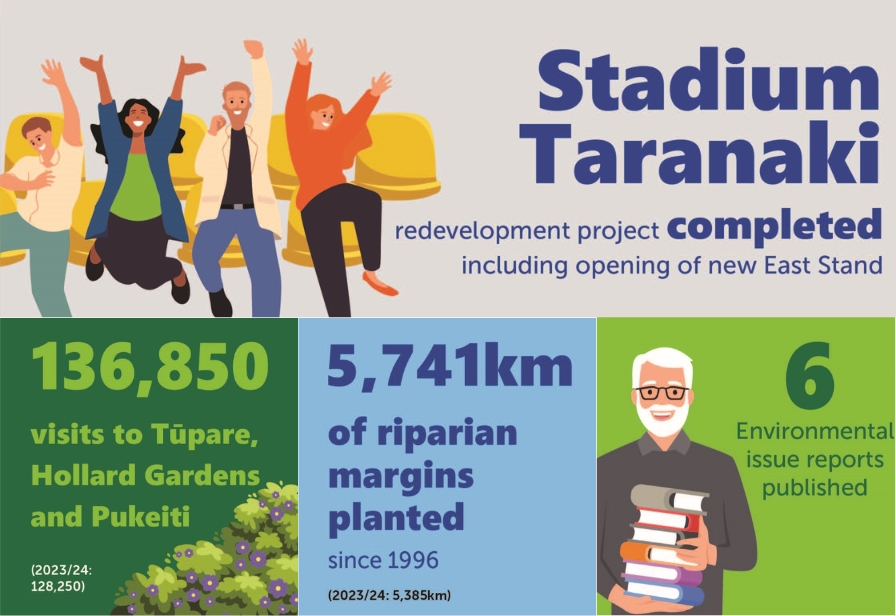The completion of the Stadium Taranaki project, new in-depth reports on environmental issues and the flagship riparian scheme hitting 8.25 million plants were among the key achievements for Taranaki Regional Council in the last financial year.

The 2024/25 Annual Report, which was adopted at today’s Ordinary Council meeting, also details how the Council is responding to challenges and evolving legislative changes while still delivering value-for-money services for 130,000 residents in the region.
The Council’s work streams include restoring native habitats, checking the health of waterways, protecting biodiversity, supporting sustainable land management, controlling predators and pest plants, providing public transport, maintaining three regional gardens, monitoring the climate, investing in Stadium Taranaki and owning Port Taranaki.
“It’s been a momentous year for the Council not least because we achieved our goal of creating the best regional stadium in the country with the full reopening of Stadium Taranaki,” says Chair Craig Williamson.
“That project was the biggest we’ve ever been involved with and we’re quite rightly proud of delivering a fit-for-purpose venue suitable for sport and entertainment and for use by communities across the region.
“The environment also remained front and centre with a number of success stories demonstrating our continued stewardship of Taranaki’s waterways, air and land.”
The operating deficit of $987,000 (total comprehensive income net of tax) was better than the budgeted deficit of $4.2m. This was achieved by solid cost control, postponement of work due to Government policy change and higher than expected asset revaluations.
“This result is pleasing given the difficult economic conditions, and the major and ongoing policy changes coming from central government,” adds Mr Williamson.
“The one constant we face is change as legislative frameworks are updated when priorities shift with new governments.
“The replacement of the Resource Management Act, in particular, will alter how we work, and we will have to adapt to this new legislation to ensure we continue to achieve our mission of supporting livelihoods and improving lifestyles.”
The last financial year saw more than 771,000 patrons use bus services provided by the Council while the Council’s three regional gardens – Pukeiti, Hollard Gardens and Tūpare – were visited by more than 137,000 people with around 10,000 people enjoying events organised by the gardens team.
Key policies and strategies developed or adopted included the Better Travel Choices Strategy and a review of the Climate Change Strategy and Roadmap was completed.
There were more than 1,000 contributions to community conversations, 242,300 visits to the Council’s website and the public got the chance to watch the big decisions being made around the Council table with the livestreaming of meetings.
“More than ever before, we’ve been listening to our community and what their aspirations and hopes for our amazing region are and that is directly shaping what we’re doing,” says Mr Williamson.
“While the year has not been without its challenges, we’re looking forward to learning from a review into Council decision-making processes and putting recommendations into practice to improve how we work with iwi and our wider community.”
This year saw the passing of councillor David ‘Daisy’ Lean who had served for more than 30 years. Mr Lean’s strong advocacy for the environment will leave a lasting legacy and his mahi has had a huge, positive impact on the Council and the region.
A summary of the Annual Report will be published in the Taranaki Daily News in October, and the full document will be available on the Council website.